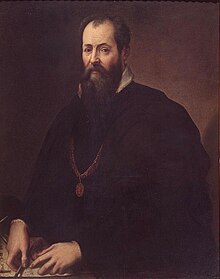Giorgio Vasari | |
|---|---|
 Self-portrait (c. 1571–74), Uffizi Gallery | |
| Born | 30 July 1511 |
| Died | 27 June 1574 (aged 62) |
| Education | Andrea del Sarto |
| Known for |
|
| Notable work | The Lives of the Most Excellent Painters, Sculptors, and Architects |
| Movement | Renaissance |
| Spouse | Niccolosa Bacci |
Giorgio Vasari (/vəˈsɑːri/, US also /-ˈzɑːr-, vɑːˈzɑːri/;[1][2][3][4] Italian: [ˈdʒordʒo vaˈzaːri]; 30 July 1511 – 27 June 1574) was an Italian Renaissance painter, architect, art historian and biographer, who is best known for his work Lives of the Most Excellent Painters, Sculptors, and Architects, considered the ideological foundation of all art-historical writing, and still much cited in modern biographies of the many Italian Renaissance artists he covers, including Leonardo da Vinci and Michelangelo, although he is now regarded as including many factual errors, especially when covering artists from before he was born.
Vasari was a Mannerist painter who was highly regarded both as a painter and architect in his day, but rather less so in later centuries. He was effectively what would now be called the minister of culture to the Medici court in Florence, and the Lives promoted, with enduring success, the idea of Florentine superiority in the visual arts.
Vasari designed the Tomb of Michelangelo, his hero, in the Basilica of Santa Croce, Florence that was completed in 1578. Based on Vasari's text in print about Giotto's new manner of painting as a rinascita (rebirth), author Jules Michelet in his Histoire de France (1835)[5] suggested the adoption of Vasari's concept, using the term Renaissance (rebirth, in French) to distinguish the cultural change. The term was adopted thereafter in historiography and is still in use today.
- ^ "Vasari". Collins English Dictionary. HarperCollins. Retrieved 1 June 2019.
- ^ "Vasari, Giorgio" (US) and "Vasari, Giorgio". Oxford Dictionaries UK English Dictionary. Oxford University Press. Archived from the original on 9 November 2021.
- ^ "Vasari". The American Heritage Dictionary of the English Language (5th ed.). HarperCollins. Retrieved 1 June 2019.
- ^ "Vasari". Merriam-Webster.com Dictionary. Merriam-Webster. Retrieved 1 June 2019.
- ^ Michelet, Jules (1835). Histoire de France: Renaissance. Vol. VII. Paris.